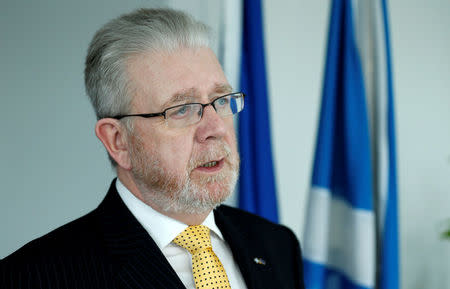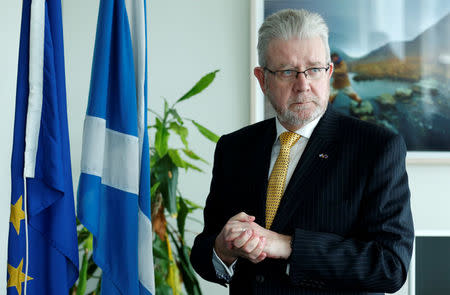Scots government seeks quick EU deal, sees EU understanding
By Alastair Macdonald BRUSSELS (Reuters) - The Scottish government thinks Europeans will understand it has a "special" case to be given EU membership as soon as possible if Scots vote for independence before Britain quits the bloc, a minister said on Monday. Speaking in Brussels after First Minister Nicola Sturgeon announced a planned vote on secession before Brexit in 2019, Michael Russell said any option for Scotland staying in the European Union when the UK left would be a matter for later discussion. But, whatever happens, the nationalist government in Edinburgh would want to be out of the EU for "the shortest possible time", Russell, Scotland's Brexit minister, said. "If the people of Scotland say they wish to continue in membership, then clearly it would be incumbent on those negotiating on both sides to say let us do that as quickly as possible," Russell told Reuters. Noting that Scotland already complies with European laws and its people have been EU citizens for 44 years, Russell added: "I think those are pretty special circumstances." Sturgeon complained that British Prime Minister Theresa May, who will trigger the two-year withdrawal process this month, was not seeking a special deal for Scotland that might, say, have left it in the EU single market once the rest of the UK leaves. Scots voted by a 24-point margin to stay in the EU in last June's referendum, while England and Wales voted to leave. "That creates a clear set of circumstances for us - but also more widely for others in Europe to understand. And I'm sure they would understand," Russell said. Acknowledging that Scotland was not a party to the Brexit talks, he added: "The 27 (EU states) must recognise that there is an issue within the UK which will require to be resolved. So I don't think anybody could turn their eyes away from this issue. That will require sensitive and careful handling." EU SEES "COMPLICATION" The European Commission, whose chief negotiator Michel Barnier is preparing to handle two years of talks with the British government in London, declined comment on Sturgeon's announcement, describing it as an internal matter for Britain. An EU official involved in preparing Brexit talks stressed that Brussels would only talk to May's London government. A Scottish independence vote during the Brexit negotiations would be "quite a complication" for negotiators, the official added. It is too early to speculate on how Brussels might handle that, the official said, but it would be simpler if all of the United Kingdom left on schedule in early 2019. Then, if Scots voted for independence, they could negotiate to join the EU. Many diplomats believe Scotland could join quite quickly, perhaps within a year or two. However, it would first need to set up independent institutions and accept EU conditions. Russell said he thought it "inconceivable" that the British government would block a Scottish request to hold a second independence referendum, after that in 2014, which the nationalists lost by a 10-point margin. And he said it would be "irresponsible" for it to try and prevent one before Brexit. "That is the right time for the decision to be made," he said. "There will be no status quo. There will either be essentially out of the EU with the UK or there will be a future in the EU for Scotland." He said polls showing a small majority against independence were a "statistical dead heat" and the SNP would campaign to win over the 38 percent of Scots who voted in favour of Brexit. That would involve committing to fight the EU for a better deal on fishing -- Russell said successive London governments had failed to defend what is a key economic interest in Scotland -- and persuading some voters that high immigration from the rest of the EU was "overwhelmingly positive" for Scotland. (Editing by Gareth Jones)

 Yahoo News
Yahoo News 



